As Library Project Funding Details Emerge, Concerns Grow
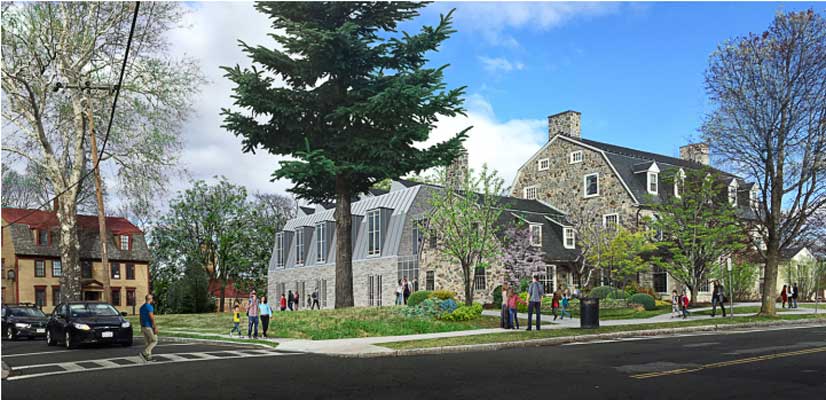
Clamors for better transparency from the public and concerned town councilors have elicited new financial information from the Jones Library trustees and fundraisers. However, questions surround what the Jones Library still needs to contribute, when it is due, and whether the library can realistically meet its obligation.
Answering these questions is particularly important as the town begins difficult discussions of how to fairly apportion limited funds across the FY2027 budget. An unrealized $10 million revenue stream to the town hangs in the balance.
Here is a rundown of what we have learned and questions that remain.
Q1. What Does the Library Owe the Town?
Pinning down just what the Library Trustees owe the town toward the renovation-expansion has proved challenging. Town Manager Paul Bockelman announced at the November 17 Town Council meeting that his October 20 Town Manager’s Report included an update from the Jones Library Capital Campaign, submitted by Co-Chairs Lee Edwards and Kent Faerber.
This document declares the Trustees’ final cash obligation to be $15.8 million.
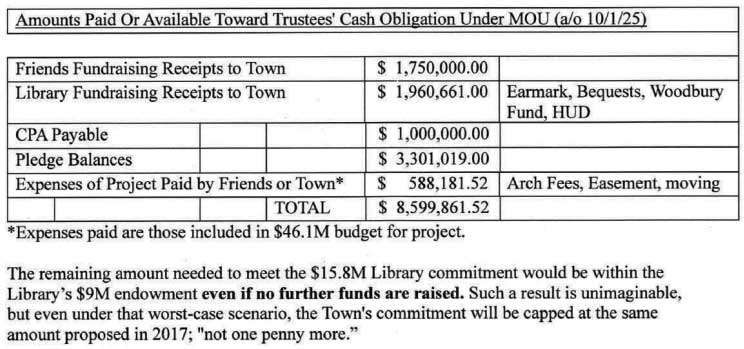
This amount includes expenses that the trustees agreed to pay to enable design changes after a failed construction bid. Labeled Expenses of Project Paid by Friends or Town, this contribution totaled $588,181.52.
Also listed is a $1 million Community Preservation Act grant which the Town Council approved in 2021 and is largely funded by local property taxes.
The Capital Campaign has recently requested an additional $1.4 million in FY27 CPA funds.
See related: Not One Penny More? Jones Library is Back, Asking the Town for Even More Money
The Capital Campaign lists an additional $3,301,019 in Pledge Balances as available to fund the library share, although these intentions have not yet been converted to cash gifts or remitted to the town.
Q2. How Much Has the Library Paid the Town?
Director Sharon Sharry presented a spreadsheet of payments by the library for the building project at the November 18 meeting of the Library Budget and Investments Committee.
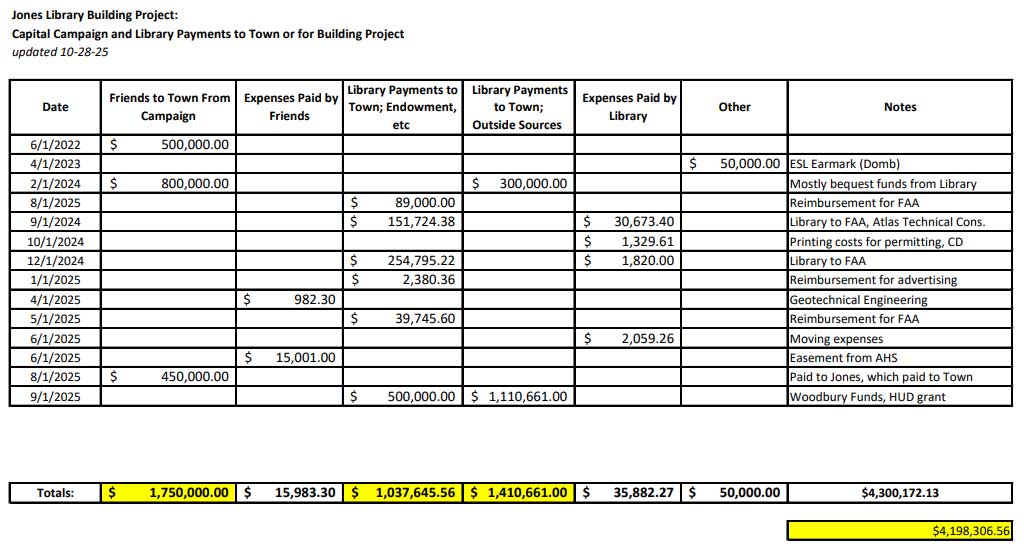
Sharry applied yellow color-coding to totals that she described as contributing to the library share of the project, adding that “we’re in the process of reconciling all of this with the town.” These add up to $4,198,306.56 that the Jones Library has paid through October 2025 toward its $15.8 million obligation. Setting aside the $1 million CPA grant that is being managed by the town, this leaves $10,601,693 as the remaining trustee obligation.
Budget Committee Chair Lee Edwards reported that the value of the library endowment stood at $9,273,731 as of November 1, 2025, or $1.3 million less than the remaining obligation to the town.
Q3. What Repayment Schedule Does the Town Expect?
Despite assuring the Town Council at an April 14 vote on rescinding the $46.1 million appropriation for the library project that a cash flow would soon be provided and updated regularly, the Town Manager has not yet announced one.
This information is important because it places a responsibility on the Jones Library to follow an agreed upon payment schedule, which allows the town to save money by borrowing for the project only when needed.
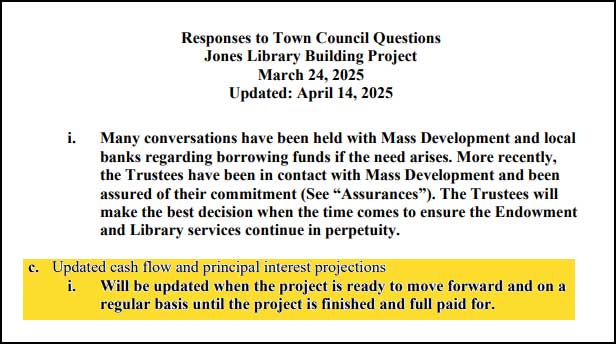
At the October 28 meeting of the Finance Committee, Amherst Finance Director Sean Mangano indicated the difficulty committing the library to a fundraising schedule.
“For conservatism’s sake, we’re assuming [library contributions] just come in at the end and then if they come in earlier, it’ll improve our cash flow,” he said.
This inability to rely on library funding during the construction phase is forcing the town to borrow $9 million in a short-term note in December 2025, and to plan on a consolidated borrowing of $30 million next March.
See related: Where’s the Oversight? Finance Committee Fails to Oversee $46 Million Library Project
Q4. When Is the Library Obligation Due?
The date that the full library share must be completely paid to the town is specified in Town-Library MOA Amendment #2. It states that the library share shall be paid in full to the town simultaneously with the town’s receipt of the final installment of construction grant money from the Massachusetts Board of Library Commissioners (MBLC) which is projected to occur “on or about June 30, 2027.”
If the MBLC payment is extremely delayed for some reason, the MOA stipulates that the library payment must be made at the latest “one year from the date on which a certificate of occupancy is issued for the Project.”

This final deadline depends on when the renovation-expansion project will be completed and ready to open. Unfortunately, as members of the Jones Library Building Committee (JLBC) have pointed out, this date is unknown due to the absence of a project schedule provided by Owner’s Project Manager Trey Logie of Colliers.
See Related: Letter: Jones Expansion Financials Still a Mystery for Town Council and the Public
Town Council representative to the JLBC George Ryan reported at the November 17 council meeting, “the building is actually somewhat ahead of schedule and everything is copacetic.” However, when the project schedule doesn’t exist, this is difficult to confirm.
Moreover, public records recently obtained by the Amherst Indy indicate that the project design has encountered code compliance issues that threaten to delay or add expense to the project.
Q5. How Will the Library Endowment Be Impacted?
On April 14 the Town Council met to decide whether to rescind funding for the problem-ridden and controversial $46.1 million library building project. Library Trustee President Austin Sarat presented MOA Assurances that the library would be able to meet its financial obligation to the project.
This document is in serious need of updating, as many of its assumptions are no longer valid.
The assurances rely on grants that were not guaranteed, millions in donations that had been pledged but not yet converted to cash gifts, energy credits that depend on a significant Energy Use Intensity reduction in the new building, and the assumption that the Jones Library’s fundraising income will enable it to qualify for a $4 million loan.
The library document also claims a balance to be raised of $8,300,000 rather than the $10,601,693 remaining obligation described above.
The analysis includes a Jones Library endowment model that assumes a 2.9% draw rate for FY2026-2028 which would provide roughly $255,000 to spend on library operations. Sharon Sharry has previously estimated that a $300,000 draw is necessary to maintain level services.
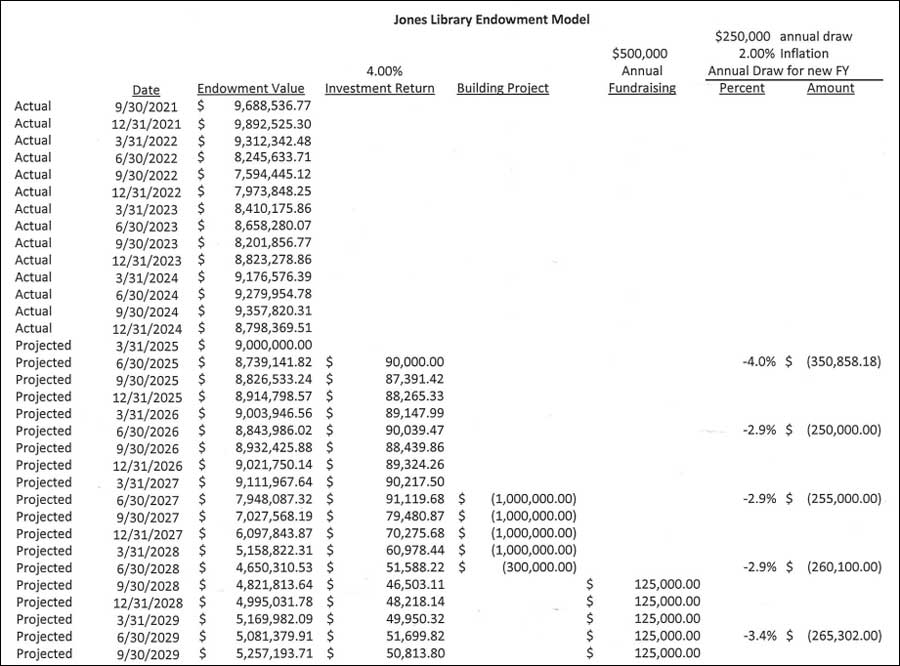
This plan has changed. It was disclosed at the November 18 Budget Committee meeting that the library proposes to increase its draw in FY27 to 4.8% rather than lower it to 2.9% as presented in the model. The increased draw, Director Sharry explained, is to support the hiring of three positions: a teen librarian, a special collections assistant and a maintenance and cleaning worker.
The library endowment model shows the trustees withdrawing $4,300,000 to support their building project commitment in 2027-28, reducing the endowment value from $9,000,000 to $4,650,310.
The model includes a column heading labeled “$500,000 Annual Fundraising” and shows $125,000 being added to the endowment each year after FY27. In this way the model purports to replenish the value of the endowment back to $9 million by 2037.
It is difficult to feel confident that the library can bank on fundraising $500,000 annually and add $125,000 to the endowment, considering that in recent months it has not been uncommon for the Capital Campaign to report less than $20,000 in gifts and pledges in a month.
Added to this uncertainty is a transition that the Capital Campaign is undergoing. Co-Chair Lee Edwards reported in August that the Friends of the Jones Library are seeking fresh faces in their fundraising corps. “Kent [Faerber] and I are acutely aware of the fact that we represent a certain generation,” she remarked.
Looking ahead, Edwards told the Budget Committee that the Jones Library will need to hire a professional Chief Development Officer responsible for fundraising.
“It’s not a volunteer operation,” she made clear.
“There are a lot of people working on it [now] who are not being compensated but we couldn’t do it without the very small paid staff that we do have, and this is something I think probably needs to be started within your head,” she said to the director.
“Agreed,” replied Sharry.

Quiz of the week (month, year, decade, century):
What nearby institution has an endowment around 500 times the Jones Library’s?
Any more questions?